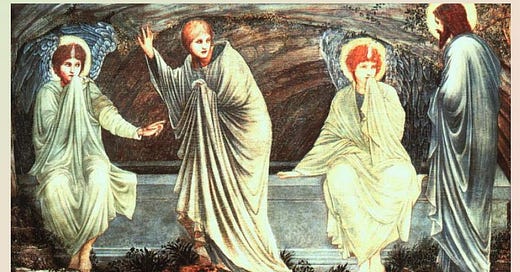From Prophecy to Fulfilment - Proclaiming Christ's Resurrection
April 1, 2024 - Monday in the Octave of Easter
Acts 2:14, 22-33; 16:1-2a and 5, 7-8, 9-10, 11; Matt. 28:8-15
Psalm 16 is a prayer for protection. The psalmist declares his faith in the Lord, the God of Abraham, Isaac, and Jacob, and rejects any other gods. The Lord controls his destiny (see Ps 16:1-6), so he trusts that not even death will be able to harm him. The Lord will lead him along the path of life to the fullness of life and “the delights at [God’s] right hand” (Ps 16:11), signifying an exalted position of authority.
We can easily understand why Saint Peter quoted this psalm in his first sermon after Pentecost (see Acts 2:22-32). From the Christian perspective, the psalm is a prophecy of Jesus’ resurrection and ascension at the right hand of the Father. The apostle indicates that David, being a prophet, “foresaw and spoke about the resurrection of the Christ, that he was not abandoned to Hades, nor did his flesh see corruption” (Acts 2:31). Then, he declared that what David prophesied happened. The Father raised Jesus from the dead and exalted His Beloved Son at His right hand (see Acts 2:32-33).
What Psalm 16 prophesied and Saint Peter preached as its fulfilment, the Gospel narrates for us. Two groups are running from the tomb: the fearful yet overjoyed women and the terrified guards. Both carry the same message but to different recipients. The women carry the message to Jesus’ disciples; the temple guards take it to the authorities. Both carry the same message, but the reception of that message is going to be different. The disciples are going to be overjoyed, and the Jewish authorities are upset. The disciples would believe, and the authorities would concoct a cover-up story that the body was stolen. That story was still in circulation when Matthew wrote his Gospel. Centuries later, St. Justin Martyr wrote that it was still believed by many Jews of his time.
The risen Christ does not meet the guards. He only meets the women who embrace his feet in an act of worship. His words remove their fear but retain their joy. Then, Jesus instructs them to go to his brothers - that is how he now calls his disciples - to leave Jerusalem and go back to Galilee. They will see him there. Galilee was the place where Jesus began his proclamation of the Gospel and called His disciples. In Jerusalem, Jesus accomplished His mission, but His disciples miserably failed him there. By calling them back to Galilee, the risen Christ offered them a new beginning, a fresh start.
The liturgy of the Word offers us a few valuable lessons. Once again, we are reminded of how Jesus fulfilled the ancient prophecies of the Old Testament. Therefore, we need to be familiar with the Bible. Second, we have not invented fake news. It was invented centuries ago. Finally, we have to acknowledge that in one way or another, we have failed Jesus. And yet, our Lord calls us His brothers and sisters and offers us a fresh start in the very place where our journey with Christ began. Let us then go back to that place, to our Galilee. We will meet the risen Christ there and begin our journey of faith anew.




